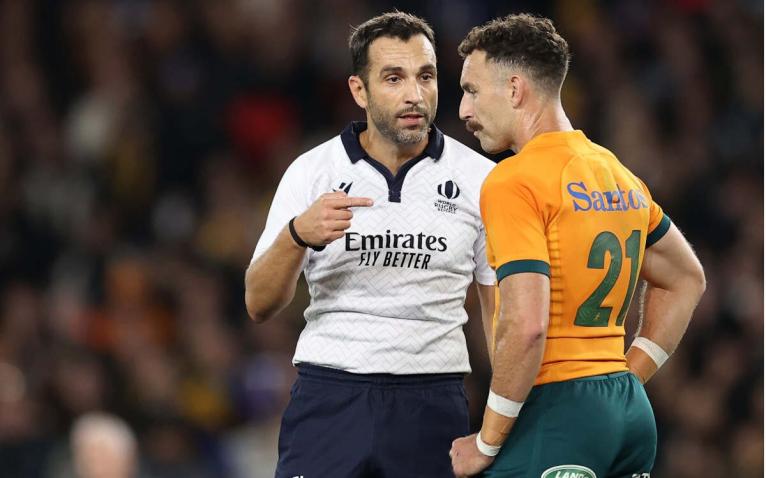Not since the great Serge Blanco scored a last-gasp winner against the Wallabies in the 1987 World Cup semi-final have Australians disliked a Frenchman as much as they do Mathieu Raynal right now.
Newspaper headlines slammed the French ref for his decision to penalise Bernard Foley for time-wasting in last Thursday’s Bledisloe Cup match, a decision that led to the All Blacks scoring a winning try with the last play of a pulsating encounter.
Pundits were also peeved. “I thought it was a disgraceful decision by the referee,” fumed former Australian centre Tim Horan. Alan Jones, once a coach of the Wallaabies and now an outspoken media commentator, labelled Raynal a “little pip-squeak from Paris”. He’s actually from Perpignan, Mr Jones, at the other end of the country, but never let the facts get in the way of a good rant.
Even some Poms weighed in on the side of the Wallabies, with former England-fly-half turned pundit Stuart Barnes labelling Raynal’s decision one of “abject stupidity” in a column for The Times.
Barnes defended Foley, claiming he was ‘doing what any kicker in the world would do… taking another five or ten seconds up’. In other words he was wasting time. It may be common practice in professional rugby but it is still gamesmanship that has been tolerated for too long. Foley’s misfortune was in encountering a referee who was not in the mood for dawdling. One might say Foley’s was the act of ‘abject stupidity’ given that Raynal had already warned him for time wasting in the first half.

“I reckon you could have another 15 referees, big referees for World Rugby, that would have taken that calmly and wouldn’t have got overhauled by the experience,’ said Tim Horan in the immediate aftermath of New Zealand’s 39-37 victory.
That statement could be turned on its head: of 15 big referees only one would have the courage to penalise the home town fly-half for time wasting. Horan even claimed that Raynal ‘cracked under pressure’. Come of it, Tim! Making a judgement like that in front of 50,000 raucous Australian fans? I’d call that withstanding the most intense pressure.
In France, the press and pundits have unanimously backed Raynal. Asked about the incident on a rugby TV show last weekend, Sébastien Chabel said it was a ‘tough call but a courageous one’
In France, the press and pundits have unanimously backed Raynal. Asked about the incident on a rugby TV show last weekend, Sébastien Chabel said it was a ‘tough call but a courageous one’. Another ex-Bleu, Jean-Baptiste Lafond, was also supportive of Raynal and, giving the Aussies a taste of their own medicine, he called Foley a ‘cretin’ for ignoring the referee’s instructions.
Whatever one’s take on the decision it’s notable that for the third time in five years a French referee has whistled his way to a Test match controversy. English fans still tremble with rage at the mention of Pascal Gauzere, who made two decisions in their 2021 Six Nations clash with Wales that resulted in two tries for Alun Wyn Jones’s side. One was a blatant knock-on by Louis Rees-Zammit in the build-up to Liam Williams’ try, and the other, the decision that prompted one tabloid to label Gauzere ‘obnoxious’, was when he allowed Wales to take a penalty as England captain Owen Farrell spoke to his team about discipline under their posts.
It was another team wearing red, the British and Irish Lions in 2017, who got the rub of the green from a Frenchman in the third Test against New Zealand. With the score at 15 apiece with two minutes to go, Poite penalised Lions hooker Ken Owens for being offside at the restart. The All Blacks had a shot at goal to win the match. For a fleeting moment. Poite downgraded his decision to ‘accidentally offside’ after a brief conflab with the TMO. Unlike last week, when New Zealand talked loftily about respecting the referee’s decision, the Kiwi media savaged Poite and his fellow officials: ‘idiots in white’, in the opinion of the esteemed New Zealand Herald.

Why is it French refs who often find themselves in the eye of the storm? Because they’re merde, would doubtless be the collective cry from Down Under. That could be argued of Pascal Gauzere, certainly after his performance against England that led to a rare – albeit gentle – rebuke from World Rugby. Gauzere retired four months later, an indication perhaps that he recognised he was past his peak.
In the case of Raynal, however, it wasn’t that he overlooked an obvious fault or failed to communicate with the captain that enraged Australia; on the contrary, his communication with Foley was clear and precise. ‘I will switch on the time, and we play now’, Raynal told the Australian, who was standing two metres away. Raynal blew his whistle and then yelled ‘Time on’. What bit of that did Foley not understand?
Foley’s mistake was to assume Raynal was all mouth and no trousers. He clearly hasn’t watched any Top 14 rugby. If he had, Foley would have understood that French refs are different to Anglophone ones. There is not the matiness, the chumminess, the banter, that one so often hears on the pitch in Britain or Down Under between referees and players. That’s not casting aspersions on English-speaking refs; they are scrupulously impartial but they have a rapport with players that doesn’t exist in France. These makes them less inclined to ping a player, whatever his club or country, for a subtle infraction such as Foley’s. A stern warning, a ‘come on, Bernard, stop faffing about’, but not penalising a good bloke like Bernie.
In brief exchanges with captains, the referees addressed them as ‘Monsieur’, also using the formal ‘vous’ and not the informal ‘tu’. French officials don’t referee with a light touch; it is strict and authoritarian. They mean what they say.
I watched three Top 14 matches on television at the weekend and none of the referees referred to the players by their names; it was shirt colour or shirt number as they warned them they were in danger of straying offside or had committed some other offence. In the brief exchanges with captains, the referees addressed them as ‘Monsieur’, also using the formal ‘vous’ and not the informal ‘tu’. French officials don’t referee with a light touch; it is strict and authoritarian. They mean what they say.
How many times do we see English-speaking referees warning teams about offside, that the next infringement will result a yellow card, and how many times do they fail to follow through with their threats? Frequently. Anglophone refs are too soft.
It is also worth bearing in mind that the French Top14 was the first league to introduce a timer on taking penalties (60 seconds) and conversions (90 seconds) way back in 2014-15; referees are therefore accustomed to brisk kicking of any description.

In a wider context, France remains a more hierarchical society than the Anglophone world. There is more deference to age and authority. A small but in its way significant example: British police routinely address members of the ‘public as ‘mate’ or ‘guys’; a French police officer would never dream of such familiarity, using only ‘Monsieur’ and ‘Madame’.
Why is this relevant? Because it makes French referees more dispassionate and less empathetic than their Anglophone colleagues – ‘cold-blooded’ one could even say – and as a result referees officiate with more pedantry. This has its disadvantages. French referees can be frustratingly pernickety about scrums and the breakdowns.
Raynal deserves nothing but praise for his decision. Too often in recent years referees have shown themselves weak in disciplining players for small acts of insubordination.
But they also are prepared to make the controversial calls that in many cases a British, Aussie or Kiwi ref aren’t.
Raynal deserves nothing but praise for his decision. Too often in recent years referees have shown themselves weak in disciplining players for small acts of insubordination, whether it’s surly backchat at one of their decisions, petulantly throwing the ball away when a call goes against their side or, as in the case of Foley, time-wasting. Such behaviour demeans rugby union, and it’s time referees were more rigorous in reminding players who is the boss.
Mathieu Raynal did that in Melbourne last Thursday. Far from being a French Farce, his performance was a French show of force, and rest assured in future Foley and every other fly-half will keep good time in his presence. And that can only be good for the game.



Comments
Join free and tell us what you really think!
Sign up for free